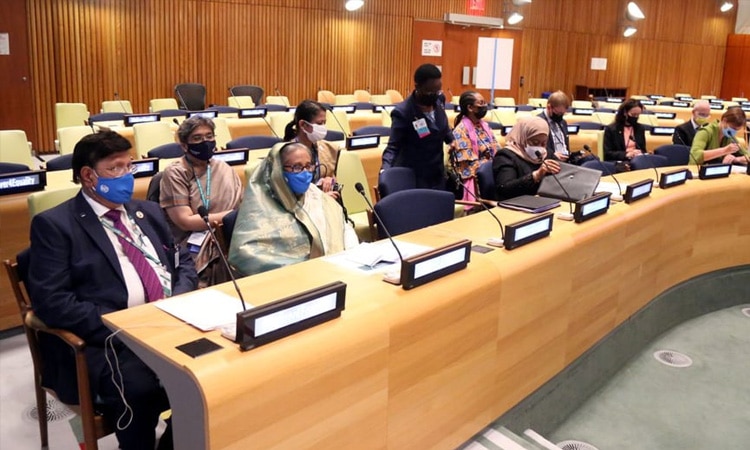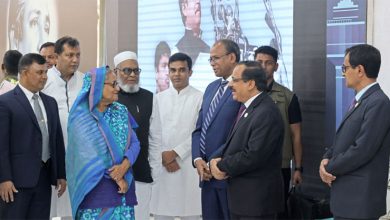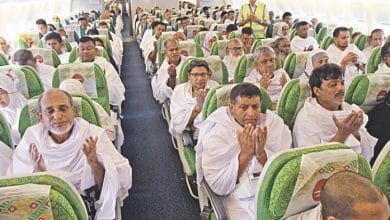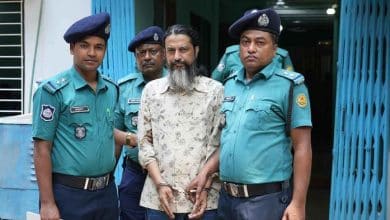The Prime Minister called for strong action on climate issues

Prime Minister Sheikh Hasina has called upon world leaders to take strong steps to tackle the crisis of climate change. She made the call yesterday amid speculation about the US commitment to climate change, especially at the 76th session of the UN General Assembly.
In a closed-door meeting of world leaders ahead of the week-long session of the UN General Assembly, the Bangladeshi prime minister reiterated his call for strict implementation of the Paris Agreement to keep global warming below 1.5 degrees Celsius.
“I would like to underscore the significance of positive and robust international climate coalitions that can reduce the global carbon emission effectively to move towards carbon neutrality before the mid-century. So, I called for your urgent and decisive action to save our future generations,” she said.
Sheikh Hasina, in her prerecorded speech, said the Covid-19 pandemic has shown how quickly a pandemic can turn into a catastrophic global crisis.
She said: “It has also taught us that the only way to combat a global crisis is through strong collective response.”
During COP-21 in Paris, the members have agreed to a landmark agreement to combat climate change and achieve climate resilience. And the target was to keep the global temperature rise within 1.5°C, she added.
“However, we must admit that our current efforts to achieve that target are highly inadequate. As such, we need forceful, dynamic and rapid action plan to limit the global greenhouse gas emission to save us and our planet,” the prime minister said.
Mentioning that South Asia is the most vulnerable region to climate-induced natural disasters, she said millions of people will become climate refugees in coastal and small island countries if sea level rises by a meter.
Glacial Lake Outbursts, cloud outbursts or heavy rains will bring catastrophic impacts on Himalayan countries like Bhutan, Nepal and parts of India, she added.
Though Bangladesh has no contribution to global warming, it is one of the most vulnerable countries for its limited coping capacities and specific geographical features, Hasina said.
As per ADB’s prediction, Bangladesh would face annual economic cost equivalent to 2% of her GDP by 2050 and up to 9.4% by 2100 if current emissions continue. “I’m sure that it’s true for all other LDCs and climate vulnerable countries.”
However, Bangladesh has taken excellent adaptation and mitigation activities to enhance its climate resilience and this year Bangladesh is planting 11.5 million trees across the nation marking the “Mujib Borsho,” the birth centenary of Father of the Nation Bangabandhu Sheikh Mujibur Rahman, she said.
“We’ve also launched ‘Mujib Climate Prosperity Plan’ to mobilize resources for a secured future.”
Bangladesh has been honoured to be chosen to lead the Climate Vulnerable Forum (CVF) for the second term, she said, adding that the regional office of Global Centre on Adaptation for South Asia has been established in Dhaka.
The prime minister said Bangladesh has also launched the CVF “Midnight Survival Deadline for the Climate” initiative for all the nations to deliver new and enhanced NDCs by midnight on December 31, 2020.
“I would also like to flag that the Paris Agreement reaffirmed the obligations of the developed countries for mobilizing climate finance. MDBs and IFIs should come forward for more vigorous provisions of climate financing through concessional finance and debt relief and ensure the access to technology for all,” she said.
Besides, extreme weather events are already displacing many more people than violent conflicts, Hasina said.
“Therefore, the ‘loss and damage’ provision should be mainstreamed. Likewise, relocation and protection of displaced persons need due focus in global discourses to ensure their protection,” she said.
The Bangladesh prime minister said the United Nations Framework Convention for Climate Change (UNFCCC) remains the most appropriate platform to push forward our global agenda.
Bhutanese Prime Minister Dr Lotay Tshering, UN Secretary-General António Guterres, COP26 President Alok Sharma and UNFCCC Executive Secretary Patricia Espinosa, among others, spoke virtually at the function.
The UN General Assembly convenes this much-discussed session every year. However, for the first time in the organization’s 75-year history, world leaders were unable to attend the session in person last year due to the Corona epidemic.
This year too, many are taking part in a virtual session of the UN’s policy-making body. All 193 members of the General Assembly have equal voting rights.
More than a hundred world leaders are coming to New York to attend this high-level annual gathering and session of the United Nations, as well as other meetings.
On the recommendation of the Security Council, the UN General Assembly appoints the Secretary-General, elects temporary members of the Security Council, and approves the organization’s budget during its regular sessions from September to December. Also, organize sessions if needed.





